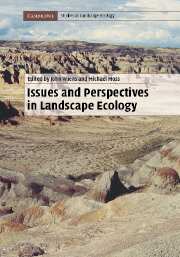Book contents
- Frontmatter
- Contents
- List of contributors
- Preface
- PART I Introductory perspectives
- PART II Theory, experiments, and models in landscape ecology
- 3 Theory in landscape ecology
- 4 Hierarchy theory and the landscape … level? or, Words do matter
- 5 Equilibrium versus non-equilibrium landscapes
- 6 Disturbances and landscapes: the little things count
- 7 Scale and an organism-centric focus for studying interspecific interactions in landscapes
- 8 The role of experiments in landscape ecology
- 9 Spatial modeling in landscape ecology
- 10 The promise of landscape modeling: successes, failures, and evolution
- PART III Landscape patterns
- PART IV Landscape dynamics on multiple scales
- PART V Applications of landscape ecology
- PART VI Cultural perspectives and landscape planning
- PART VII Retrospect and prospect
- Index
- Plate section
- References
4 - Hierarchy theory and the landscape … level? or, Words do matter
from PART II - Theory, experiments, and models in landscape ecology
Published online by Cambridge University Press: 20 November 2009
- Frontmatter
- Contents
- List of contributors
- Preface
- PART I Introductory perspectives
- PART II Theory, experiments, and models in landscape ecology
- 3 Theory in landscape ecology
- 4 Hierarchy theory and the landscape … level? or, Words do matter
- 5 Equilibrium versus non-equilibrium landscapes
- 6 Disturbances and landscapes: the little things count
- 7 Scale and an organism-centric focus for studying interspecific interactions in landscapes
- 8 The role of experiments in landscape ecology
- 9 Spatial modeling in landscape ecology
- 10 The promise of landscape modeling: successes, failures, and evolution
- PART III Landscape patterns
- PART IV Landscape dynamics on multiple scales
- PART V Applications of landscape ecology
- PART VI Cultural perspectives and landscape planning
- PART VII Retrospect and prospect
- Index
- Plate section
- References
Summary
The ill and unfit choice of words wonderfully obstructs the understanding
Francis BaconThe term “level” is often used in association with “landscape,” as in “landscape level.” What is the, or a, landscape level? Is the landscape a level in a landscape hierarchy? And how do the answers to these questions impact the use of hierarchy theory to investigate and understand landscapes? I will attempt to answer these questions in this essay. Even if I am unable to satisfy you with definitive answers, I will hopefully stimulate your thinking about these topics. In the end I hope to have at least sensitized you to the need for care in choosing to use the words “landscape level.”
First, “landscape level” is not synonymous with “landscape scale.” Too frequently, “landscape level” is used as if it were interchangeable with “landscape scale.” This usage implies (or asserts) a synonymy between “level” and “scale” that does not exist. Scale refers to the physical spatial and temporal dimensions of an object or event, its size or duration. Scale also involves units of measure. The spatial or temporal properties of an object or event are characterized by measurement on some quantitative scale. As we shall see below, “level” refers to a “level of organization” within a hierarchically organized system, and the level of organization is quantified by a rank ordering relative to other levels in the system. A level of organization is not defined by its physical dimensions.
- Type
- Chapter
- Information
- Issues and Perspectives in Landscape Ecology , pp. 29 - 35Publisher: Cambridge University PressPrint publication year: 2005
References
- 8
- Cited by



